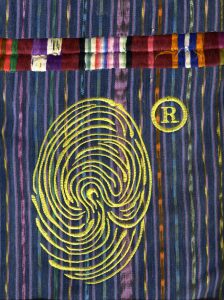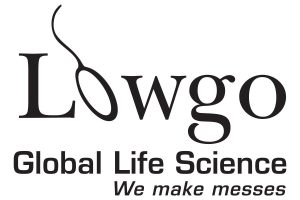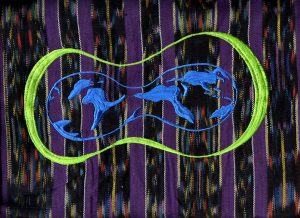
NYFA Current, Biweekly Arts News
February 23, 2005, Vol. 14, No. 4
In Their own Words
The Obsolete Self-Lowgo as Protozoan Critique of Globalization by the Artist Formerly Known as Christy Rupp
[Reprint]
The popular language of globalization argues that as economic entities become increasingly interconnected, the world grows smaller. The world may be growing smaller, but it’s not uniting. In fact, neighborhoods, cities, and countries are torn apart and reorganized thanks to the effects of today’s global economy, leaving some humans increasingly unnecessary because they’re too poor to buy things. Like cells, nations are multiplying by dividing.
As it’s unlikely that I’m on the rapture express a-list, I decided to imagine a different type of survival model.
Due to racism, greed, and war, the concept of individuality has passed its era of relevance. I declare myself obsolete as an individual and am now to be regarded as the brand Lowgo. The featured product of the corporation is the making of messes. Our logos may be found primarily in the indigenous textiles of Guatemala where we seek to patent their tradition as our own intellectual property, paying homage to it while simultaneously defending ourselves against would-be competitors in court.
Just as biopirates have now claimed the rainforests and heritage agricultural species as their personal laboratories, Lowgo asserts its claim to the visual traditions of indigenous peoples. All over the world, biotechnicians are scouring for exotic life forms used for centuries by indigenous peoples for medicines and nutrition. Desperate to patent marketable organisms, biotech and pharmaceutical corporations hold hostage the DNA of rice, wheat, corn, and a variety of other traditional crops in an effort to control the market, forcing growers to purchase licensing agreements on genetically modified crops and preventing family farmers from saving their own seeds. Paralleling the strategy of this empty earth or “Terra Nullis” worldview, Lowgo has jumped into the race to register a patent on a visual tradition and we turned our eye toward the work of the Mayan peoples, living as they do so close to the edge of the global precipice.
Lowgo’s Board of Directors has engaged Guatemala’s indigenous weaving tradition as a metaphor for the ability to corrupt and legally claim anything as our property. By claiming Guatemalan traje (native dress), we brand a product before it hits the market. In the future, the tentacles of Lowgo’s corporate hunger will reach further into the highlands and up to the clouds in search of additional marketable assets.
Lowgo’s logo features a one-celled animal because we epitomize the corporation as a protozoan, or single-celled, universe. The plankton-like organism in our logo was lifted from the Gaia theory, which proposes that the biosphere—like a living organism—thrives through natural feedback mechanisms. Embracing the values of greed, we consider ourselves a single celled-organism independent of all others, as though our actions occur in a vacuum of profit-induced euphoria, and as if there are no consequences. It’s not unlike Adam Smith’s invisible hand of the marketplace, which justifies greed by using the accumulation of wealth as an applicable feedback indicator. By choosing to solve environmental and sociological problems with marketing techniques, Lowgo rejects the opinion that we thrive in a system with a delicate balance. The belief that we exist in distinction from nature creates unfeeling, merciless, and ultimately unsustainable cravings for power. We seek to replace nature with the fantastic achievements of human marketing. Like our mission statement says, we make messes.
Thanks to fabulously successful sales teams from Wall Street to Wal-Mart, we’re living in the midst of a great extinction, comparable in intensity to the period when the dinosaurs died out 65 million years ago. Because globalization stifles participation by all but the most competitive entrepreneurs, it breeds homogeneity by merging corporate entities. As diversity vanishes, our systems evolve into a monoculture, much easier to regulate.

So what’s left for the US to manufacture and export?
How about revolution imposed from above, or, the overnight delivery of democracy? That’s why Lowgo’s new product will seek to repackage Islamic intellectual property featuring the addition of stars and stripes. Recreating the Middle East in our image will be facilitated by selling the icon of Old Glory to our oil-rich production partners. Anticipating a need to infiltrate evil weaving cooperatives all over the world in order to roust WMDs that look like colorful yarns, we propose a new Oil for Textiles initiative. They give us their oil,we agree not to bomb their looms.
As a war power in an era when the F-word stands for freedom, we don’t need trading partners. We have no need to outsource a war and no need for allies as we redesign the world in our own image. After all, our cleptocracy affords few of us even a personal shoplifter, much less a conscience.
Christy Rupp’s most recent solo show was at Frederieke Taylor Gallery in 2004. Upcoming projects will focus on the question, “Evolution: Is it for Everyone?” Lowgo’s website was designed by ACTowery at Blue Pearl Studio.
For more information on the artist formerly known as Christy Rupp, visit:
www.christyrupp.com
www.greenmuseum.org
www.frederieketaylorgallery.com
©christy rupp 1962–2025 | site by lisa goodlin design

